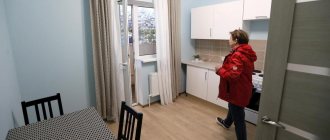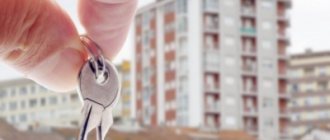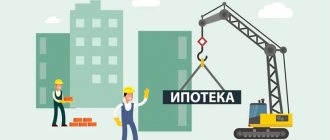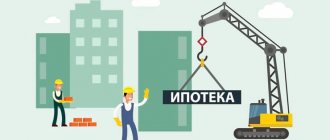Home » Buying and selling an apartment » Risks and consequences when purchasing an apartment with illegal redevelopment
3
Buying an apartment always involves certain risks. One of them is illegal redevelopment that does not correspond to what is indicated in the technical passport. What could this problem mean and what consequences might arise from purchasing such housing? Let's look at this issue in more detail in this article.
Redevelopment or redevelopment: what's the difference?
Reconstruction involves replacing or moving slabs, plumbing, utilities and other similar elements. This usually requires making changes to government databases. Redevelopment involves changing the geometric parameters of the apartment.
Example: Moving a wall to reduce the area of the living room and increase the area of the kitchen is a redevelopment. And swapping a toilet with a bathroom is a reconstruction.
Redevelopment is often closely related to redevelopment, and almost always both concepts are used in the same context. Hereinafter, any of the options for changes made to the apartment will be called “Redevelopment”.
Redevelopment can be legal or illegal. In the first case, the owner of the apartment first coordinates future work with the regulatory authorities, obtains the appropriate permits, and only then begins repairs. When he finishes, you will need to call specialists so that they make the appropriate changes to the Technical Passport.
Unauthorized redevelopment is carried out by the owner without the consent of anyone. As a result, if the regulatory authorities find out about this (for example, from neighbors), they will either have to return everything as it was or try to legitimize what has already been done.
Not every type of redevelopment can, in principle, be legalized. Many changes that seem logical and correct to the owner are actually prohibited from the point of view of fire safety or other similar structures.
What specific actions are considered unauthorized?
Unauthorized redevelopment is a redevelopment carried out without obtaining permission. It is legally established that before starting work, the owner, tenant or tenant of the premises is required to submit an application attaching a project, sketches and descriptions of the planned work on redevelopment of the premises, its partial or complete reconstruction.
It is worth considering that even if there is an approved project, the owner or the person who received the power of attorney to carry out the redevelopment will have to answer for technical errors during the redevelopment or non-compliance with the project.
Legally, work that requires a permit includes:
- Moving or demolishing load-bearing walls and structures, which leads to an increase in the load on other load-bearing elements, no matter what kind of house it is: apartment, multi-storey or private cottage.
- Removal of heating elements, radiators or pipelines to a balcony or loggia.
- Connecting a heated floor to a hot water supply system.
- Relocating a bathtub and toilet and placing plumbing equipment in places not intended for it.
- Installation of partitions and additional walls to change the layout of an apartment or house, as well as increasing the number of rooms by dividing existing ones.
- Changing the size and shape of door and window openings.
- Moving the balcony, increasing its area, any change in the flights of stairs.
- Transfer and change of life support systems: ventilation, water supply, sewerage, gas pipeline and heating system, including transfer and replacement of radiators with a different type.
- Installation of new equipment, which involves moving and changing utility systems.
- An increase in the area of non-residential premises at the expense of residential premises, if this makes the total non-residential area larger by 25% or more.
- Demolition of the wall separating the kitchen from the living room, if there is a gas stove or water heater in the kitchen.
- Relocating rooms that use water so that wet rooms are located above the living spaces of neighbors below.
- Other significant changes.
When carrying out all work, they must be recorded step by step in a special journal, which is presented to the commission when accepting the redevelopment. Thanks to this log, the commission receives a complete picture of the work performed and can identify inconsistencies at a certain stage.
It is worth remembering that work on redevelopment of residential premises must be carried out by a company that has all the necessary permits and certificates. Unauthorized redevelopment can be dangerous both for the owner of the premises and for his neighbors.
Risks of illegal redevelopment when purchasing secondary housing
What is the threat to an ordinary apartment buyer from illegal redevelopment? A fine. And possibly confiscation of property. First, soft measures are applied: warning. But if this does not work, and the owner refuses to bring the housing into compliance with the requirements of the controlling structures, then fines in the amount of 1 to 2.5 thousand rubles may be applied (Article 7.21 of the Code of Administrative Offenses of the Russian Federation).
If this does not help (the person paid the fine, but still did not return the housing to its previous form), the norms of Article 29 of the Housing Code of the Russian Federation may be applied. In particular, the apartment will be seized by a court decision, sold at auction and the new owner will be obliged to bring the housing to its original condition, corresponding to the Technical Passport. The previous owner will receive compensation in the amount of the cost of the apartment minus the costs that the new owner will be forced to incur to return the premises to its previous form.
How to avoid problems:
- Even at the stage of negotiations regarding the purchase of an apartment, request a Technical Passport and compare the data in it with the real state of affairs. This must be done during a personal inspection of the apartment.
- If the apartment does not comply with the technical passport, the easiest way is to refuse the purchase. If for some reason this is not possible, you need to start bargaining with the seller and demand that the price be reduced by the amount that will be spent on “reverse remodeling” (returning the property to its previous state).
- If a person has already bought an apartment and only after that he learned about the existence of redevelopment (for example, he did not pay attention to it during the inspection), he must independently restore the apartment to its original form.
- If for some reason it is impossible to restore the apartment to its original form, then you can try to legitimize the already completed redevelopment.
- If legalization fails, the only option left is to go to court and demand that the completed redevelopment be recognized as not threatening the remaining residents of the house. If a positive decision is made, then nothing will have to be redone, although the redevelopment will still remain illegal.
Considering the fact that when considering a case, the court will first of all consider the problem from the point of view of the law and, in particular, those norms according to which the owner has already been denied legalization of the redevelopment, the likelihood that a decision will be made in favor of the applicant tends to zero.
What is considered a redevelopment?
An apartment is a separate room that is part of a house. An apartment suitable for living is built according to strict rules and regulations. Compliance with them is a guarantee of safe living for all residents of the house.
An important document of an apartment is its technical passport. It describes the characteristics of the house and the apartment itself, there is a drawn plan indicating the dimensions of all the premises of the housing. Only the owner of the apartment can obtain a technical passport from the BTI.
According to the information specified in the technical passport, apartment owners pay for services for its maintenance and taxes. Redevelopment of an apartment is considered to be actions that entail a change in its technical plan.
Risks of illegal redevelopment when buying an apartment in a new building
All risks regarding fines and possible seizure of property remain. However, if the redevelopment is a consequence of the developer’s carelessness, the problem can be solved much more simply: you just need to write an application and demand or change the documents, allegedly this layout was originally conceived. If this is not possible, then the developer must be required to return the housing to its previous condition at his own expense.
Many developers provide several years of warranty on sold apartments. This case may not be considered a guarantee, but if you start actively complaining and threaten to contact the regulatory authorities, then most likely the company will meet the buyer halfway and do everything at its own expense. The problems that may arise in case of complaints are not worth the costs that can be incurred to correct the incorrect layout. In the most extreme case, the developer may offer the buyer to exchange his “wrong” apartment for another similar, but “correct” one.
Features of illegal perestroika
Purchasing an apartment with unapproved redevelopment has a number of nuances.
Most banks do not approve properties with illegal conversions . If the bank accepts the borrower’s primary documentation, then the documents for problematic housing will not. Registration of such real estate with a mortgage is associated with many risks for the bank (read more about the features of buying an apartment with a mortgage here). So, in the event of a loan debt and the apartment being confiscated, the bank will have to spend personal funds to legalize the repairs in order to quickly sell it and get their money back.
If the bank has approved such an apartment, then the borrower is usually given a period (6-12 months) during which he is obliged to coordinate all changes with the authorities. If the redevelopment is not legalized, the lender has the right to terminate the contract unilaterally and demand early repayment of the loan.
IMPORTANT : The borrower has the right to make redevelopment in the mortgaged apartment, unless otherwise provided in the contract. Most often, carrying out capital work requires approval not only from the authorities and engineers, but also from the bank.
Unauthorized redevelopment and mortgage lending
Unauthorized redevelopment of an apartment that is planned to be provided as collateral when applying for a mortgage loan can become a serious problem and ultimately even lead to the bank refusing a loan. The fact is that formally it is possible to sell or buy such housing, but the bank does not want to get involved with collateral, with which it will later have problems.
If the client ultimately cannot repay the debt, this apartment will have to be seized and sold at auction. It is logical that we will have to say one way or another that an illegal redevelopment has been carried out in the apartment. As a result, the number of buyers for such housing will be several times smaller, and the likelihood that the bank will receive the required amount from the sale is significantly lower.
Main risks
When making a transaction with an apartment with illegal redevelopment, both parties are at risk - both the seller and the buyer. Risks for the buyer :
- If the fact of illegal redevelopment is revealed after the purchase, then the new owner has no choice but to coordinate the work carried out with the authorities on his own. This requires additional time and money.
- Neighbors or ill-wishers may complain about the illegality of the old owner’s actions, and the new owner will have to answer.
- For failure to obtain approval from the authorities, the owner of the premises faces a fine and other penalties.
- Illegal redevelopment can threaten the safety of new residents. If the work was not agreed upon, then it is not a fact that the repairs were carried out in accordance with all building codes and regulations. And this, in turn, can lead to a deterioration in living conditions.
- During the inspection of the facility, the commission may recognize changes made to the premises as unacceptable. In this case, the new owner will either have to restore the premises to its original form, or spend money on eliminating detected defects and inconsistencies. And all at your own expense.
Risks on the part of the seller:
- Concealing the fact of illegal redevelopment may become grounds for termination of the purchase and sale agreement.
- It will be difficult for the owner of such a problematic apartment to find a buyer for a long time. Not every person wants to purchase housing, in which to legalize the redevelopment they will have to go through many authorities and invest money.
- If the presence of illegal reconstruction is revealed after the sale, the buyer may demand monetary compensation from the seller in court for the costs incurred to legalize the repair work.
- In order to sell the property faster, the owner will have to reduce its value.
How to make illegal redevelopment legal
In some cases, it is much easier to legitimize a redevelopment that has already been done than to return everything as it was. But this is not the easiest procedure. Let's take a closer look at it.
Procedure
To legalize the redevelopment, you need:
- Contact the regulatory authority with a corresponding application.
- Pay a fine. It does not matter that the redevelopment of the apartment was carried out by the previous owner, the only important thing is who is its owner at the time of the application.
- Agree on the date and time of a visit to the apartment by specialists who will check whether the existing redevelopment does not violate any standards.
- If no serious violations are identified, you can ask to make changes to all documents and make a new registration certificate for the housing.
Documentation
In order to legalize the redevelopment, you will need to prepare the following documents:
- Applicant's passport.
- Extract from the Unified State Register of Real Estate for the apartment in which the redevelopment was carried out.
- Existing technical passport.
Usually just a passport and an extract are enough. The registration certificate and possible other documents are rarely requested.
Expenses
Approximate expenses for the new owner of such housing:
| Type of expenses | Sum |
| Fine for illegal redevelopment | From 1 to 2.5 thousand rubles |
| Costs for obtaining a new registration certificate | From 10 thousand rubles |
If legalization still fails, you will have to do major repairs and bring the apartment into compliance with the documentation. It is still cheaper than losing your home for this reason.
Deadlines
An application for legalization of redevelopment is considered in about 1 week. After this, you need to wait up to 1 month for specialists. It may take them another 1 to 3 months to complete the necessary documentation.
Unauthorized redevelopment can cause the new owner of the apartment a huge amount of trouble. However, this is far from the only problem that may arise when buying a home. At a free consultation, experienced lawyers will consider the most popular options for controversial situations and give their recommendations for solving problems. These same specialists are ready to accompany the entire transaction, thanks to which it is possible to exclude any fraudulent schemes and identify potential risks in advance.
FREE CONSULTATIONS are available for you! If you want to solve exactly your problem, then
:
- describe your situation to a lawyer in an online chat;
- write a question in the form below;
- call Moscow and Moscow region
- call St. Petersburg and region
Save or share the link on social networks
(
1 ratings, average: 5.00 out of 5)
Author of the article
Natalya Fomicheva
Website expert lawyer. 10 years of experience. Inheritance matters. Family disputes. Housing and land law.
Ask a question Author's rating
Articles written
513
- FREE for a lawyer!
Write your question, our lawyer will prepare an answer for FREE and call you back in 5 minutes.
By submitting data you agree to the Consent to PD processing, PD Processing Policy and User Agreement
Useful information on the topic
5
What questions to ask when buying an apartment
Before purchasing, the Buyer will need to check the selected apartment for legal purity...
22
What documents are needed for buying and selling an apartment?
Registration of the purchase and sale of an apartment involves the collection of the necessary package of documents. They…
35
Registration of a transaction for the purchase and sale of an apartment in the MFC
Multifunctional (MFC) are created to provide public services...
1
Buying an apartment in another city with a mortgage
The need to buy a home in another city arises quite often. This…
2
Buying an apartment with a military mortgage: step-by-step instructions
The state pays great attention to the armed forces and, in particular, comfortable...
17
Risks when buying an apartment with minor children
Purchasing an apartment, one of the owners of which is a minor child –…
Advantages
Despite the possible risks, purchasing such an apartment has its advantages.
- Firstly, housing with illegal redevelopment can cost 10% less than the market price . For the buyer, this is a great opportunity to save on the purchase of real estate. Even after investing additional funds to legalize the work, the new owner remains in the black.
- Secondly, the apartment has an individual, not standard layout . The demand for such housing is always high. By legalizing the repair work, the new owner will be able to sell it at a higher price.
Special articles from our experts will help you conduct a purchase and sale transaction competently and avoid unnecessary problems in the future. From them you will learn:
- What costs do the seller and buyer bear?
- How much will it cost to complete the contract?
- Deposit, advance, deposit - what's the difference?
- What to look for when buying real estate in a new building?
- What are the risks of buying an apartment received by inheritance?










